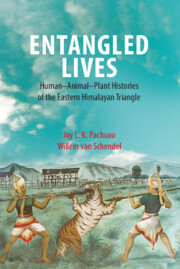10 - Dealing with Environmental Decay
Published online by Cambridge University Press: 15 June 2022
Summary
Ever since their arrival in the Triangle, humans have been busy expanding their ecological niche and so make their lives easier and more sustainable. They found solutions to many of the problems they faced. Unlike other living beings, they were masters of technological innovation and began to think of their trajectory in terms of ‘progress’. That trajectory also involved the human niche becoming a more unequal place: some people lived lives of relative comfort while others struggled to survive. Historians have long paid attention to these two aspects. They have routinely understood human technological progress in glorious and self-gratulatory terms, such as ‘civilisation’ and ‘development’. And they have described human inequalities in terms of ‘social differentiation’, ‘poverty’, ‘exploitation’ and ‘backwardness’.
What most scholars have only recently focused on, however, are the knock-on effects of human niche construction beyond the human sphere, and how to write adequate histories of the region that take into account the connectedness of human and non-human histories. It was only with quickening environmental degradation in the late twentieth century that this became imperative. In this chapter we look at how, during this ‘Great Acceleration’ in humanity's impact on the world, human niche construction ultimately went haywire, causing serious ecological devastation. The following chapter (‘The Elephant Strikes Back’) will consider the ways in which non-human actors and processes have begun to curb human niche construction.
In Chapter 2 we saw how, early on, humans emerged as the world's ‘ultimate ecosystem engineers’. Their advantage over other organisms (microorganisms, plants and animals) is threefold. They have an innate ability to work together and connect by means of language; they create new technologies to alter their environment; and they have highly adaptable cultures that transfer accumulated knowledge from one generation to the next. These three qualities kick-started a process of incessant habitat upgrading, allowing humans to restrict the availability of resources to non-human organisms.
By the mid-twentieth century, as the number of humans in the Triangle steadily grew, their environmental impact began to speed up and its adverse effects on other organisms became more noticeable. In this chapter we look at some aspects of environmental manipulation that are particularly relevant to life in the Triangle today: species migration, environmental awareness, conservation and the fate of the commons.
- Type
- Chapter
- Information
- Entangled LivesHuman-Animal-Plant Histories of the Eastern Himalayan Triangle, pp. 211 - 241Publisher: Cambridge University PressPrint publication year: 2022



